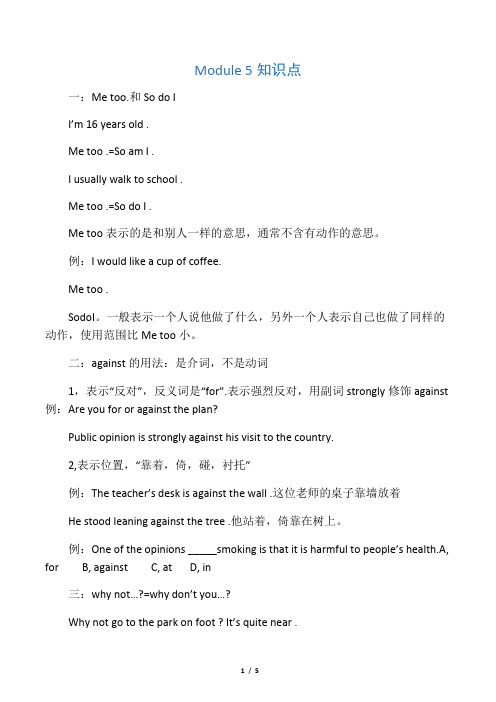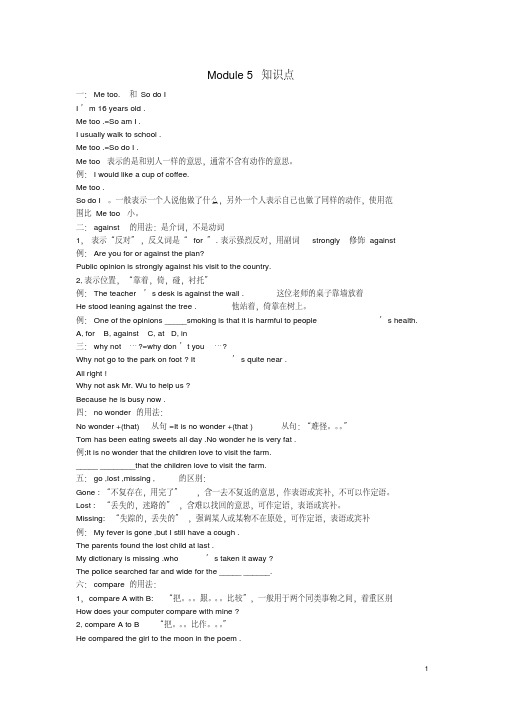2019九年级英语上册 Module 5 Museums词句精讲精练 (新版)外研版
【精】最新九年级英语上册Module5Museums词句精讲精练(新版)外研版

教学资料参考范本
【精】最新九年级英语上册Module5Museums词句精讲精练
(新版)外研版
撰写人:__________________
部门:__________________
时间:__________________
词句精讲精练
词汇精讲
1. rule
(1) rule作名词,表示“规则, 规章, 规定, 条例”。
例如:
You should be observant of the traffic rules.
你应该遵守交通规则。
(2 rule作名词,还可以表示“习惯; 惯常的做法”。
例如:
She makes a rule of going for a walk every afternoon.
她有每天下午散步的习惯。
【拓展】
be against the rule 表示“违反规定”,相当于“break the rule”;其反义词是“follow/obey the rule”,意为“遵守/服从规定。
例如:It is against the traffic rule to cross the street while the red light is on.
红灯亮时横穿马路时违反交通规定的。
We should follow the rule of exam.
我们应该遵守考试规则。
2. in trouble
in trouble 表示“遇上麻烦;处于困境”。
例如:
She is ready to help others in trouble.。
部编版2020九年级英语上册 Module 5 Museums词句精讲精练 (新版)外研版

Module 5 Museums词句精讲精练词汇精讲1. rule(1) rule作名词,表示“规则, 规章, 规定, 条例”。
例如:You should be observant of the traffic rules.你应该遵守交通规则。
(2 rule作名词,还可以表示“习惯; 惯常的做法”。
例如:She makes a rule of going for a walk every afternoon.她有每天下午散步的习惯。
【拓展】be against the rule 表示“违反规定”,相当于“break the rule”;其反义词是“follow/obey the rule”,意为“遵守/服从规定。
例如:It is against the traffic rule to cross the street while the red light is on.红灯亮时横穿马路时违反交通规定的。
We should follow the rule of exam.我们应该遵守考试规则。
2. in troublein trouble 表示“遇上麻烦;处于困境”。
例如:She is ready to help others in trouble.她愿意帮助那些处于困境的人们。
He realized that he was in trouble.他意识到他遇上了麻烦。
【拓展】辨析be in trouble 与get into troublebe in trouble 表示状态,一般表示已经有麻烦; get into trouble是一个动作或过程,意为“惹上麻烦,陷入麻烦,闯祸”,多用于还没发生的情况。
例如:Nobody likes to get into trouble.没有谁愿意惹麻烦。
When you are in trouble, I will help you.当你遇上麻烦的时候,我会帮助你。
2019九年级英语上册 Module 5 Museums词句精讲精练 (新版)外研版

Module 5 Museums词句精讲精练词汇精讲1. rule(1) rule作名词,表示“规则, 规章, 规定, 条例”。
例如:You should be observant of the traffic rules.你应该遵守交通规则。
(2 rule作名词,还可以表示“习惯; 惯常的做法”。
例如:She makes a rule of going for a walk every afternoon.她有每天下午散步的习惯。
【拓展】be against the rule 表示“违反规定”,相当于“break the rule”;其反义词是“follow/obey the rule”,意为“遵守/服从规定。
例如:It is against the traffic rule to cross the street while the red light is on.红灯亮时横穿马路时违反交通规定的。
We should follow the rule of exam.我们应该遵守考试规则。
2. in troublein trouble 表示“遇上麻烦;处于困境”。
例如:She is ready to help others in trouble.她愿意帮助那些处于困境的人们。
He realized that he was in trouble.他意识到他遇上了麻烦。
【拓展】辨析be in trouble 与get into troublebe in trouble 表示状态,一般表示已经有麻烦; get into trouble是一个动作或过程,意为“惹上麻烦,陷入麻烦,闯祸”,多用于还没发生的情况。
例如:Nobody likes to get into trouble.没有谁愿意惹麻烦。
When you are in trouble, I will help you.当你遇上麻烦的时候,我会帮助你。
九年级英语上册 Module 5 Museums知识点 (新版)外研版

Module 5知识点一:Me too.和So do II’m 16 years old .Me too .=So am I .I usually walk to school .Me too .=So do I .Me too表示的是和别人一样的意思,通常不含有动作的意思。
例:I would like a cup of coffee.Me too .SodoI。
一般表示一个人说他做了什么,另外一个人表示自己也做了同样的动作,使用范围比Me too小。
二:against的用法:是介词,不是动词1,表示“反对”,反义词是“for”.表示强烈反对,用副词strongly修饰against 例:Are you for or against the plan?Public opinion is strongly against his visit to the country.2,表示位置,“靠着,倚,碰,衬托”例:The teacher’s desk is against the wall .这位老师的桌子靠墙放着He stood leaning against the tree .他站着,倚靠在树上。
例:One of the opinions _____smoking is that it is harmful to people’s health.A, for B, against C, at D, in三:why not…?=why don’t you…?Why not go to the park on foot ? I t’s quite near .All right !Why not ask Mr. Wu to help us ?Because he is busy now .四:no wonder的用法:No wonder +(that)从句=It is no wonder +(that )从句:“难怪。
【2020】最新九年级英语上册Module5Museums词句精讲精练(新版)外研版

7. 找到,发现 ___________________8. in trouble ___________________
9. 上楼___________________10. 禁止拍照___________________
You mustn’t tell it to anyone. 你绝不可以告诉任何人。
红灯亮时横穿马路时违反交通规定的。
We should follow the rule of exam.
我们应该遵守考试规则。
2. in trouble
in trouble 表示“遇上麻烦;处于困境”。例如:
She is ready to help others in trouble.
她愿意帮助那些处于困境的人们。
我盼望能自己一人在这所房子。
We look forward to the return of spring.
我们期待着春天的到来。
China uses materials very carefully.
和西方相比,中国使用物资很节省。
如果我们把这两只蝴蝶相比较,就会发现他们之间有很多不同。
【拓展】
8. pay attention to
II. 根据汉语或首字母提示,完成下列单词,使句意明确,语言通顺。
1. When class begins, we should pay a____________________ to the teacher.
2. I live on the first floor while my brother lives ____________________(楼上).
精选九年级英语上册Module5Museums知识点(新版)外研版

Module 5 知识点一:Me too. 和So do II’m 16 years old .Me too .=So am I .I usually walk to school .Me too .=So do I .Me too 表示的是和别人一样的意思,通常不含有动作的意思。
例:I would like a cup of coffee.Me too .So do I 。
一般表示一个人说他做了什么,另外一个人表示自己也做了同样的动作,使用范围比Me too 小。
二:against 的用法:是介词,不是动词1,表示“反对”,反义词是“for”.表示强烈反对,用副词strongly修饰against例:Are you for or against the plan?Public opinion is strongly against his visit to the country.2,表示位置,“靠着,倚,碰,衬托”例:The teacher’s desk is against the wall .这位老师的桌子靠墙放着He stood leaning against the tree .他站着,倚靠在树上。
例:One of the opinions _____smoking is that it is harmful to people’s health. A, for B, against C, at D, in三:why not …?=why don’t you …?Why not go to the park on foot ? It’s quite near .All right !Why not ask Mr. Wu to help us ?Because he is busy now .四:no wonder的用法:No wonder +(that)从句=It is no wonder +(that )从句:“难怪。
九年级英语上册Module5Museums知识点(新版)外研版

Module 5 知识点一:Me too. 和So do II’m 16 years old .Me too .=So am I .I usually walk to school .Me too .=So do I .Me too 表示的是和别人一样的意思,通常不含有动作的意思。
例:I would like a cup of coffee.Me too .So do I 。
一般表示一个人说他做了什么,另外一个人表示自己也做了同样的动作,使用范围比Me too 小。
二:against 的用法:是介词,不是动词1,表示“反对”,反义词是“for”.表示强烈反对,用副词strongly修饰against例:Are you for or against the plan?Public opinion is strongly against his visit to the country.2,表示位置,“靠着,倚,碰,衬托”例:The teacher’s desk is against the wall .这位老师的桌子靠墙放着He stood leaning against the tree .他站着,倚靠在树上。
例:One of the opinions _____smoking is that it is harmful to people’s health. A, for B, against C, at D, in三:why not …?=why don’t you …?Why not go to the park on foot ? It’s quite near .All right !Why not ask Mr. Wu to help us ?Because he is busy now .四:no wonder的用法:No wonder +(that)从句=It is no wonder +(that )从句:“难怪。
2020九年级英语上册 Module 5 Museums词句精讲精练 (新版)外研版

Module 5 Museums词句精讲精练词汇精讲1. rule(1) rule作名词,表示“规则, 规章, 规定, 条例”。
例如:You should be observant of the traffic rules.你应该遵守交通规则。
(2 rule作名词,还可以表示“习惯; 惯常的做法”。
例如:She makes a rule of going for a walk every afternoon.她有每天下午散步的习惯。
【拓展】be against the rule 表示“违反规定”,相当于“break the rule”;其反义词是“follow/obey the rule”,意为“遵守/服从规定。
例如:It is against the traffic rule to cross the street while the red light is on.红灯亮时横穿马路时违反交通规定的。
We should follow the rule of exam.我们应该遵守考试规则。
2. in troublein trouble 表示“遇上麻烦;处于困境”。
例如:She is ready to help others in trouble.她愿意帮助那些处于困境的人们。
He realized that he was in trouble.他意识到他遇上了麻烦。
【拓展】辨析be in trouble 与get into troublebe in trouble 表示状态,一般表示已经有麻烦; get into trouble是一个动作或过程,意为“惹上麻烦,陷入麻烦,闯祸”,多用于还没发生的情况。
例如:Nobody likes to get into trouble.没有谁愿意惹麻烦。
When you are in trouble, I will help you.当你遇上麻烦的时候,我会帮助你。
- 1、下载文档前请自行甄别文档内容的完整性,平台不提供额外的编辑、内容补充、找答案等附加服务。
- 2、"仅部分预览"的文档,不可在线预览部分如存在完整性等问题,可反馈申请退款(可完整预览的文档不适用该条件!)。
- 3、如文档侵犯您的权益,请联系客服反馈,我们会尽快为您处理(人工客服工作时间:9:00-18:30)。
Module 5 Museums词句精讲精练词汇精讲1. rule(1) rule作名词,表示“规则, 规章, 规定, 条例”。
例如:You should be observant of the traffic rules.你应该遵守交通规则。
(2 rule作名词,还可以表示“习惯; 惯常的做法”。
例如:She makes a rule of going for a walk every afternoon.她有每天下午散步的习惯。
【拓展】be against the rule 表示“违反规定”,相当于“break the rule”;其反义词是“follow/obey the rule”,意为“遵守/服从规定。
例如:It is against the traffic rule to cross the street while the red light is on.红灯亮时横穿马路时违反交通规定的。
We should follow the rule of exam.我们应该遵守考试规则。
2. in troublein trouble 表示“遇上麻烦;处于困境”。
例如:She is ready to help others in trouble.她愿意帮助那些处于困境的人们。
He realized that he was in trouble.他意识到他遇上了麻烦。
【拓展】辨析be in trouble 与get into troublebe in trouble 表示状态,一般表示已经有麻烦; get into trouble是一个动作或过程,意为“惹上麻烦,陷入麻烦,闯祸”,多用于还没发生的情况。
例如:Nobody likes to get into trouble.没有谁愿意惹麻烦。
When you are in trouble, I will help you.当你遇上麻烦的时候,我会帮助你。
3. missingmissing是形容词,意为“找不到的,失踪的”。
例如:They still hoped to find their missing son.他们依然希望找到他们失踪的儿子。
【拓展】辨析 missing ; lost ; gone例如:I never found the missing letter.我一直没有找到丢失的那封信。
Don’t go too far away, or you’ll get lost.不要走得太远,否则你会迷路的。
Now it was gone, as though it had never been.现在它已逝去,仿佛它从未存在过。
4. find outfind out意为“找到,发现,查明”,多指通过调查、询问、打听、研究之后“弄明白”。
通常含有“经过困难、曲折”之后才找出难以找到的东西。
例如:Please find out when the train leaves. 请查一下火车什么时候离站。
【拓展】(1) find是动词,意为“找到”,通常指找到或发现具体的东西,强调的是找的结果。
例如:He didn’t find his book. 他没有找到他的书。
(2) look for意为“寻找”,是有目的地找,强调找的动作。
例如:Jim is looking for his little dog. Jim正在找他的狗。
5. fill…with…(1)fill…with…意为“ 把……装满……”或“使……充满……”,强调动作。
例如:Can you fill the bottle with water? 你能把瓶子装满水吗?(2)fill… with…的被动语态结构为“sth. be filled with…”,意为“……充满……”,强调状态,可与be full of 互换。
例如:The train is filled with people = The train is full of people. 火车里挤满了人。
6. look forward tolook forward to 意思是“期待,盼望”,to是介词,后面接名词或者动名词。
例如:I look forward to being alone in the house.我盼望能自己一人在这所房子。
We look forward to the return of spring.我们期待着春天的到来。
7. compare…with/to…compare…with/to… 意为“比较……与……”;“把……与……做对比”,在做状语时,两者有时可以互换。
例如:Compared with/to western countries, China uses materials very carefully.和西方相比,中国使用物资很节省。
If we compare this butterfly with/to that one, we’ll find lots of difference between them.如果我们把这两只蝴蝶相比较,就会发现他们之间有很多不同。
【拓展】compare…to…还可表示“把……比作……”。
例如:A teacher’s work is often compared to a candle.教师的工作常被比作蜡烛。
8. pay attention topay attention to表示“注意;留心;专心”,该短语中to是介词,后面可以接名词、代词、动名词或宾语从句。
例如:Don’t pay any attention to Nina—she doesn’t know what she’s talking abo ut.别理睬Nina——她根本不知道自己在说什么。
You must pay attention to the problems of spelling in your writing.你必须注意你写作中的拼写问题。
You should pay more attention to observing.你应该多注意观察。
9. of all ages(1)age作为名词,意为“年龄”。
例如:His wife is the same age as Una. 他的妻子和尤娜同年。
【注意】用age询问年龄时,用疑问词what而不用how old。
例如:What’s her age? = How old is she? 她的年龄多大?Her age is 10. = She’s ten (years old). / She’s ten years of age. 她十岁。
(2)与age相关的常用搭配:1)at the age of… 在……岁的时候。
例如:He left school at the age of 18.他18岁时离开了学校。
2)of all ages 所有年龄段的;of the same age 同龄的;of different ages 不同年龄的。
例如:The Science Museum is interesting for people of all ages.这座科学博物馆对于所有年龄段的人们来说都是有趣的。
Gary plays football with the other children of the same age.加里和其他同龄的孩子们一起踢足球。
The toys are for children of different ages.这些玩具适用不同年龄的儿童。
10. communicationscommunication 为不可数名词,意为“表达;交流;交际;传递”,表示“通信;交通联系”时,用复数形式。
例如:Telephone communications between the two cities have been restored.这两座城市间的电话通讯已经恢复。
【拓展】communicate 为动词,意为“通讯,交流,传达(意见等)”。
I communicate with him regularly by letter. 我与他定期通信。
词汇精练I. 英汉互译。
1. 盼望 ___________________2. 注意___________________3. be filled with ___________________4. 通信___________________5. 不同年龄的 ___________________6. 与……做比较_________________7. 找到,发现 ___________________ 8. in trouble ___________________9. 上楼 ___________________ 10. 禁止拍照 ___________________II. 根据汉语或首字母提示,完成下列单词,使句意明确,语言通顺。
1. When class begins, we should pay a____________________ to the teacher.2. I live on the first floor while my brother lives ____________________(楼上).3. You mustn’t a____________________ the rules in the library.4. We can do chemistry e____________________ in the chemistry lab.5. We spent w summer in Italy that year.6. He was p for being late.7. The machine is (控制) by a computer.8. All (通信) with the north were stopped by snowstorm.III.1. Don’t ________________ in the museum. It’s against the rules.2. I’m ________________ meeting them. I miss them very much.3. You must ________________ the spelling in your writing.4. The doctor looked over the crying baby g irl, but he couldn’t what was wrong with her.5. The box is too heavy to carry. It is books.6. He my homework his, and found I had made a mistake.7. They are , so they have a lot in common to talk about.8. The company was because of this accident.参考答案I. 英汉互译。
